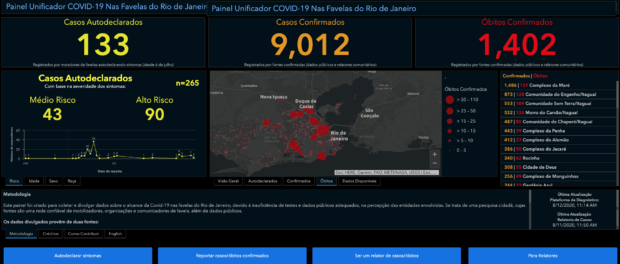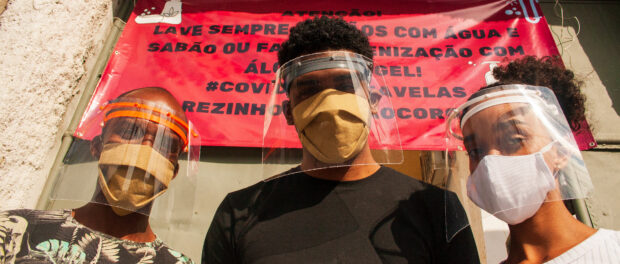August 11, 2020 PRESS RELEASE—COVID-19 IN FAVELAS UNIFIED DASHBOARD 2nd PRESS CONFERENCE
FOR IMMEDIATE RELEASE [RELEASE IN PDF]
COVID-19 IN FAVELAS UNIFIED DASHBOARD WILL HOLD ITS SECOND PRESS CONFERENCE THIS THURSDAY, 8/13
‘BEHIND THE FAVELA CORONAVIRUS NUMBERS: THE EXTENT OF THE TRAGEDY’
The Covid-19 in Favelas Unified Dashboard, an initiative that brings together favela-based collectives and civil society, will hold its second press conference this Thursday, August 13, at 2pm BRT.
August 11, 2020—During the over 150 days since Covid-19 arrived in Brazil, the virus has killed more than 101,000 people as of Sunday, according to the consortium of national media outlets collecting data from state-level health bureaus. As it stands, the Covid-19 pandemic already qualifies as the biggest health crisis in the country’s history. However, it is estimated that the total numbers are much higher, given that Brazil only counts cases confirmed by testing and that there has been drastically insufficient testing nationwide, often occurring only in serious cases.
In the state of Rio de Janeiro, according to the same source, 14,080 deaths were registered, with 8,612 of those being in the city of Rio de Janeiro proper. However, again, given that only cases confirmed on death certificates are being counted and comorbidities are being considered the cause of death in an unknown number of cases—both procedures contrary to World Health Organization recommendations—the actual number will be much higher. In addition to these facts, deaths exceeding the historical standard in the city of Rio de Janeiro are not being classified as Covid-19 cases but are rather being attributed to other causes, as described in a technical note issued by Brazil’s national health institute, the Oswaldo Cruz Foundation (Fiocruz).
Generally, it is difficult to know the magnitude of the pandemic in Brazil. And what of those living in the most vulnerable and neglected spaces in our society, which have even less testing and precarious services and opportunities for self-isolation: our favelas? It is even more difficult to know.
The most recent update carried out by the Covid-19 in Favelas Unified Dashboard on August 11, which until now has tracked 41 favelas and complexes in the Rio de Janeiro metropolitan area (154 individual favelas), reveals that among the dead, at least 1,402* are favela residents. According to one of of the dashboard’s partners, Voz das Comunidades, “The number surpasses states like Mato Grosso do Sul with 509 deaths, Amapá with 602, Tocantins with 547, Roraima with 547, and Acre with 561 deaths from Covid-19.” These data can be viewed through Fiocruz’s Covid Monitor.
Nevertheless, this number corresponds only to the favelas for which the Unified Dashboard has gathered data (note: in Rio, there are over 1,000 favelas). The data for each favela in the Unified Dashboard is gathered by the best source identified to date for each community, which in many cases have inherent limitations (either because they depend on public data or surveys carried out by volunteers). Up until now, the favelas with the most precise counts are the 16 favelas that make up the Complexo da Maré in Rio de Janeiro’s North Zone, and five communities in neighboring municipality of Itaguaí. It is because of this that the numbers from these communities are the highest on the Unified Dashboard, but there could be favelas with a higher number, for which we still do not have a source.
Redes da Maré, a prizewinning organization with a significant reach in the complex’s 16 favelas, has counted cases robustly. Given this, it is interesting to make comparisons based on their data. If we use the data gathered in Maré as a base for favelas in general, for example, we would arrive at an estimate of 15,000 people infected by the virus in favelas in the municipality of Rio de Janeiro, which is likely nearer to reality. The number would constitute 20% of Covid-19 cases in the city.
Meanwhile, A.M.I.G.A.S. (Association of Women of Itaguaí – Warriors and Social Articulators) has been carrying out intensive and detailed data collection in five communities in the municipality of Itaguaí since March, and with this, they have put together a more precise picture of the true impact of the virus in these territories (Engenho, Sem Terra, Morro do Carvão, Chaperó, and Brisamar). Combined, these five favelas have 2,671 cases and 560 deaths.
This kind of counting and estimating has become essential to begin to understand the dimension of the situation, because since May 14, Rio’s city government stopped updating the count of coronavirus deaths in favelas on the city’s official bulletin and platform. The true number of official deaths from Covid-19 in Rio de Janeiro’s favelas is therefore incognito. However, one thing is certain: Rio’s favelas are living through a pandemic within the pandemic. The pandemic is global, but the capacity to fight it is unequal between countries, states, municipalities, and inside of municipalities, as can be observed in Rio de Janeiro.
Behind the Favela Coronavirus Numbers
If the data and all of the attempts at monitoring cannot measure the reality of Covid-19 in the favelas, the accounts of leaders, community-based communicators, and residents become essential in order to have a notion of the extent of this tragedy.
Because of this, in their second press conference, the partners behind the Covid-19 in Favelas Unified Dashboard will focus beyond the data collected during this first month of monitoring.
The focus now will be on hearing first-hand accounts from partners involved in the project about how the pandemic is unfolding in their communities at the current moment, a moment in which it is said that Rio is trending downward in Covid-19 deaths, while denialism of the disease is perhaps at its peak.
It is important to emphasize that denial doesn’t happen spontaneously, nor does it constitute a political strategy, as has been observed in the attitude of the federal government and some mayors. However, it does stem from fear of unemployment. In addition to discrimination based on postal code (or its absence), in the context of the pandemic, working favela residents have been stigmatized due to Covid-19, above all those who live in favelas with a high concentration of deaths and/or confirmed cases. This is reflected in what happened with workers from the Rio das Pedras favela after it was incorrectly reported that Amparo Street was the epicenter of contamination in that favela.
What is the pandemic’s pain, color, and social class? With the resumption of economic activities, who is put at risk on public transportation? What initiatives are being carried out to combat the pandemic in this moment of denial? What new obstacles have arisen to the prevention and mitigation of Covid-19 in the last month? Among the topics that will be addressed at this press conference are the growing stigma associated with people who had or have the virus, the decrease in donations to frontline collectives fighting the virus, and the growing denial among favela residents and society.
Currently, there are an increasing number of accounts of people who hide the virus out of fear of losing not only their income, job, and home, but also social connections, as the stigma against those with Covid-19 grows in some favelas.
For this press conference, testimonies from the following partners of the Dashboard are confirmed:
- Anna Paula Sales – Association of Women of Itaguaí A.M.I.G.A.S. (Itaguaí)
- Rafael Oliveira – Vertical Favela Collective (Gardênia Azul)
- Melissa Cannabrava – Voice of the Communities (Complexo do Alemão)
- Douglas Heliodoro – Peripheral Connections Collective (Rio das Pedras)
- Maria Cristina – favela resident and Covid-19 survivor (Acari)
- Dani Moura – Redes da Maré (Maré)
- Nill Santos – Association of Assertive Women with Social Commitment (AMAC – Duque de Caxias)
- Renata Gracie – Institute of Scientific and Technological Communication and Information in Health (ICICT)/Fiocruz
- Seimour Souza – LabJaca (Jacarezinho)
- Tatiana Lima – RioOnWatch
- Theresa Williamson – Catalytic Communities
*Correction to datapoint made on August 12, 2020. Prior number, 1,276, was incorrectly assigned due to update delay on the dashboard backend. Accurate number is 1,402 deaths.
SECOND PRESS CONFERENCE DETAILS
Please join our press conference (in Portuguese) on Thursday, August 13, 2020 from 14-15:00 in Rio de Janeiro (GMT-3) on Zoom here using Meeting ID: 829 5123 0308 and Password: 522741. [RELEASE IN PDF]
WHEN: Thursday, August 13, 2020, from 2-3pm BRT
WHERE: On Zoom. Sign up here.
IMAGES FOR REPORTING: Feel free to use these images shared by project partners, maintaining image name as basis for captions and credits.
CREDITS
Realization: Catalytic Communities (CatComm)
Project Partners: A.M.I.G.A.S. | Centro Social Fusão | Coletivo Conexões Periféricas-RP | Covid por CEP | Data_Labe | Fala Roça | Favela Vertical | Fiocruz | Fórum Grita Baixada | Frente de Mobilização da Maré | LabJaca | Mulheres de Frente | Observatório de Favelas | PerifaConnection | Redes da Maré | SOS Providência | TETO | Voz das Comunidades
Development and updates: Esri – Environmental Systems Research Institute
Demographic data: Prefeitura Rio e IBGE 2010
Integration technology: Integromat
#DadosSalvamVidas #Covid19NasFavelas #PainelUnificadorCovidNasFavelas
CONTACT US
Email: press@catcomm.org
WhatsApp: +55-21-991976444






